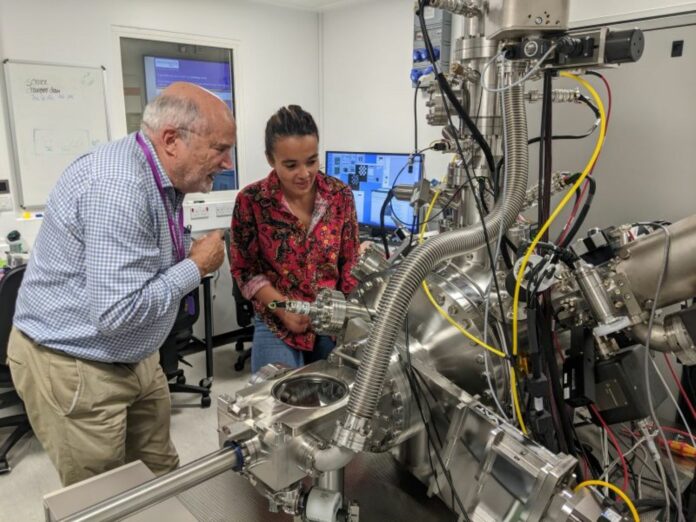The fundamental units of quantum computing, known as quantum bits or qubits*, are sensitive to small changes in their surroundings, such as variations in temperature. Current quantum computers can only sustain error-free coherence for a very short period, even when they are run in peaceful refrigerators close to absolute zero (minus 273 degrees Celsius).
Fragile quantum coherence means computing errors build up rapidly. Scientists at the Universities of Melbourne and Manchester have developed a breakthrough method to engineer the purest silicon that brings powerful quantum computers a big step closer.
This ultra-pure silicon makes it the perfect material for making quantum computers at scale and with high accuracy. Scientists engineered them using qubits of phosphorous atoms implanted into crystals of pure, stable silicon.
Their innovation could overcome a critical barrier to quantum computing by extending the duration of notoriously fragile quantum coherence. This new technique offers robust coherence, enabling quantum computers to solve complex problems within hours or minutes that would take conventional or ‘classical’ computers—even supercomputers—centuries.
University of Manchester co-supervisor Professor Richard Curry said ultra-pure silicon allowed the construction of high-performance qubit devices, a critical component required to develop scalable quantum computers.
“What we’ve been able to do is effectively create a critical ‘brick’ needed to construct a silicon-based quantum computer. It’s a crucial step to making a technology that has the potential to be transformative for humankind,” Professor Curry said.
Lead author Ravi Acharya, a joint University of Manchester/University of Melbourne Cookson Scholar, said the great advantage of silicon chip quantum computing was it used the same essential techniques that make the chips used in today’s computers.
“Electronic chips currently within an everyday computer consist of billions of transistors — these can also be used to create qubits for silicon-based quantum devices. The ability to create high-quality silicon qubits has, in part, been limited to date by the purity of the silicon starting material used. The breakthrough purity we show here solves this problem.”
Professor Jamieson said the new highly purified silicon computer chips house and protect the qubits so they can sustain quantum coherence much longer, enabling complex calculations with significantly reduced need for error correction.”
“Our technique opens the path to reliable quantum computers that promise step changes across society, including in artificial intelligence, secure data and communications, vaccine and drug design, energy use, logistics, and manufacturing.”
According to scientists, silicon is the leading candidate for quantum computer chips that will enable the enduring coherence required for reliable quantum calculations. The issue is that whereas silicon primarily consists of the desired isotope silicon-28, there is also roughly 4.5 percent silicon-29. Each atom in silicon-29 contains an additional neutron that functions as a tiny rogue magnet, shattering quantum coherence and causing mistakes in computation.
The scientists directed a focused, high-speed beam of pure silicon-28 on a silicon chip, causing silicon-28 to progressively replace silicon-29 atoms in the chip, lowering silicon-29 from 4.5% to two parts per million (0.0002%).
“The great news is that to purify silicon to this level, we can now use a standard machine—an ion implanter—that you would find in any semiconductor fabrication lab, tuned to a specific configuration we designed,” Professor Jamieson said.
In previously published work, the University of Melbourne set and continues to hold the world record for single-qubit coherence of 30 seconds using less pure silicon in collaboration with the ARC Centre of Excellence for Quantum Computation and Communication Technology. Complex quantum calculations can be completed in a reasonable amount of time—30 seconds.
According to Professor Jamieson, errors happened in milliseconds due to broken coherence, even though the current giant quantum computers had over 1000 qubits.
Now that we can produce highly pure silicon-28, our next step will demonstrate that we can simultaneously sustain quantum coherence for many qubits. A reliable quantum computer with just 30 qubits would exceed the power of today’s supercomputers for some applications,” he said.
Research grants from the Australian and UK governments supported this latest work. A Royal Society Wolfson Visiting Fellowship supports Professor Jamieson’s collaboration with the University of Manchester.
Journal Reference:
- Acharya, R., Coke, M., Adshead, M. et al. Highly 28Si enriched silicon by localized focused ion beam implantation. Commun Mater 5, 57 (2024). DOI: 10.1038/s43246-024-00498-0
